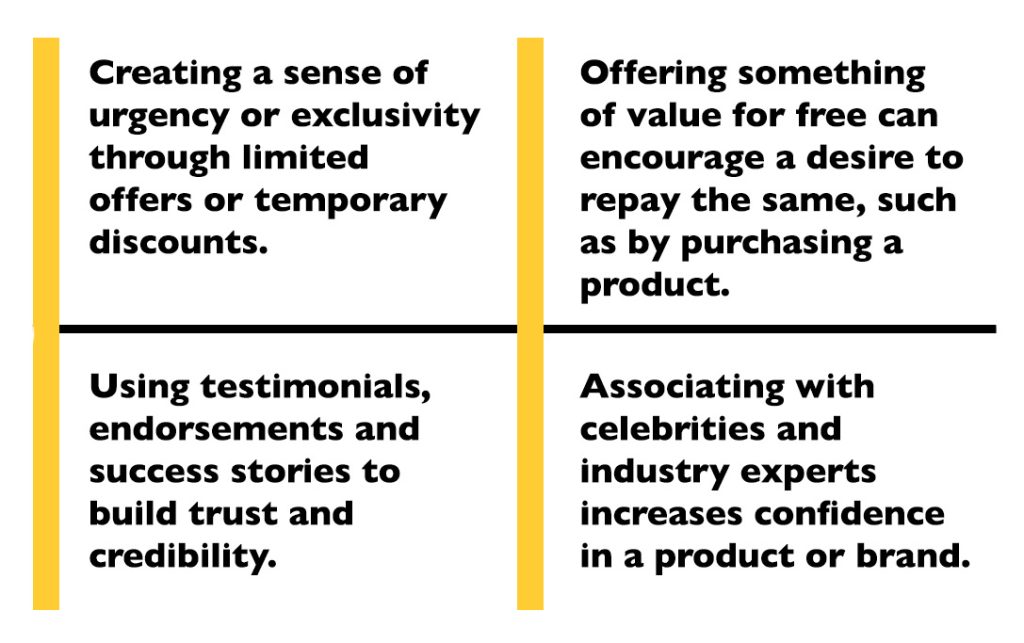In this age and with the advancement of information technology, it has become crucial for marketers, influencers and entrepreneurs to understand the psychology of consumers. Our success in marketing depends mainly on how we know our consumers’ motivations, expectations and behaviour. In this article, we will look at the factors influencing consumer decisions and learn how to use this knowledge to create effective marketing campaigns.
Today’s consumer market is fiercely competitive and more saturated than ever. With access to information and multiple choices, the decision-making process has become complex and multifaceted. Understanding consumer psychology goes beyond behavioural analysis; it includes the study of emotions, motivations, beliefs and social influences that shape buyers’ decisions.
This article will examine how emotional, rational, and social factors interact in the decision-making process. In addition, we will look at how marketers can use this understanding to develop targeted marketing strategies. Real-life examples and case studies will also illustrate how a thorough understanding of consumer psychology can contribute to business success.
Understanding the consumer

What is consumer psychology?
Consumer psychology is the field that studies how people make decisions to purchase goods and services and the factors that influence those decisions. This includes primary emotional and rational motivations to more complex social and cultural influences. Understanding consumer psychology means understanding how emotions, beliefs, personality traits and external factors shape consumer preferences and behaviour.
Why is understanding consumers critical for marketers and entrepreneurs?
- Understanding consumer psychology allows marketers and entrepreneurs to make more informed decisions when developing products, marketing strategies and advertising campaigns. This leads to a more efficient use of resources and an increased likelihood of success in the marketplace.
- In today’s world, consumers value personalisation. Understanding their needs and preferences allows you to create offers that precisely match their expectations, increasing customer loyalty and satisfaction.
- In a highly competitive marketplace, having a deep knowledge of consumers gives companies a significant advantage. They can attract and retain customers more effectively by offering unique solutions and experiences that differentiate them from their competitors.
- Understanding how consumers perceive a brand and its products helps build a positive reputation and long-term customer relationships.
- In a world where consumer trends are constantly changing, the ability to quickly adapt and respond to changes in consumer behaviour is critical to business sustainability and growth.
Emotional drivers of consumer behaviour

The influence of emotions on consumer decisions
Emotions play an essential role in shoppers’ decisions. Purchases are often made not only on the basis of objective factors such as price or quality but also on the basis of subjective feelings and sensory experiences. Emotional reactions may include the joy of buying, the desire for prestige, the satisfaction of meeting personal values, or even the fear of missing out on a favourable offer.
Joy and Satisfaction: Purchases that bring pleasure or satisfaction often encourage repeat purchases. Brands associated with positive emotions tend to have higher customer loyalty.

Fear and anxiety: Fear of failure or loss can influence purchasing behaviour. Brands that offer solutions to reduce such fears may become more favoured.

Social influence and prestige: The desire to be accepted in a particular social group or pursue prestige can also be powerful emotional triggers for purchases.

How can marketers utilise the emotional aspect in their strategies?
1. Creating an emotional connection to the brand
Marketers can create campaigns that evoke positive emotions and associations with their brand. This can be achieved through storytelling, visual content that evokes emotion, or creating unique brand experiences.
2. Using social proof and influencers
Showing how a product or service helps people achieve a desired status or affiliation can strengthen the emotional connection to a brand.
3. Addressing fears and concerns
Providing additional guarantees, quality assurance and demonstrating reliability can help reduce consumer anxiety, making it easier to choose in favour of a brand.
4. Emotional marketing
Developing marketing materials that evoke specific emotions can increase engagement and interest in a product or service.
Rational and social factors
The role of rational thinking in decision-making

Rational consumer thinking plays a vital role in the purchase decision-making process. This process involves evaluating a product or service based on its functionality, value, quality and price. Consumers actively seek information, compare alternatives and weigh the pros and cons before making an informed decision. This is especially important in situations involving large purchases or long-term investments.
Informed Choice: Providing detailed, accurate and helpful information about a product helps consumers make an informed choice. This includes technical specifications, customer testimonials, comparative analyses and product demonstrations.
Value Proposition: A clear communication proposition that emphasises the unique benefits and value of the product to the consumer reinforces rational reasons for choosing that brand.
Social influence and its importance to marketing

Social influence has a significant impact on consumer behaviour. This can occur through social norms, group pressure, opinions of opinion leaders or through societal trends. Understanding the social factors that motivate consumers allows marketers to create more targeted and effective campaigns.
Social media and Influencers: Using social media and collaborating with influencers can significantly increase a brand’s visibility and its products.
Endorsements from well-known personalities or authoritative sources build trust and increase social influence.
Community Marketing: Developing communities around a brand where consumers can share experiences and opinions helps create solid social connections and brand loyalty.
Cultural Relevance: Incorporating cultural sensitivities and values of the target audience into marketing campaigns enhances product resonance and appeal.
Buyer decision process
The buyer decision process is a sequence of steps consumers typically go through before purchasing. Understanding these steps helps marketers create effective strategies to influence buyer choices at each stage.
Stages of the decision-making process
- Awareness of need: The consumer realises they have an unresolved need or problem.
- Information search: The buyer searches for information about various products or services that can fulfil his needs.
- Evaluating alternatives: In this stage, the buyer compares different options by considering their features, prices and benefits.
- Making a buying decision: Based on the information gathered and comparison, the consumer makes a choice and makes a purchase.
- Post-purchase behaviour: After purchase, the consumer evaluates their satisfaction with the product, which can influence future purchase decisions.
Strategies to influence each stage
- Need awareness: Create content that emphasises the problems or needs that your product can solve. This can be achieved through informative articles, blogs, and social media.
- Finding information: Optimising SEO to ensure high positions in search results, providing detailed product descriptions and customer testimonials.
- Evaluating alternatives: Providing comparative analyses and reviews demonstrating your product’s advantages over competitors.
- Making a buying decision: Offering special promotions, discounts or limited offers at the decision stage to encourage immediate action.
- Post-purchase behaviour: Providing quality after-sales support, loyalty programmes and feedback to reinforce customer satisfaction and encourage repeat purchases.
Marketing triggers and personalisation
Using psychological triggers in marketing
Psychological triggers elicit an emotional response from consumers and can influence their purchasing decisions. These triggers can be used in marketing campaigns to attract attention and encourage action. Some of the most effective triggers include:

Importance of personalisation in approaching consumers
Personalisation is tailoring marketing efforts to the individual needs and preferences of each consumer. It helps to create a deeper connection between brand and customer and improve engagement. Personalisation can include:
Personalised offers: Creating offers based on a user’s previous purchases, interests or behaviour on the site.
Personalised content: Developing content that answers specific questions or needs of the target audience through personalised emails or recommendations on the site.
Personalised communication: Using customer data to create more personal and meaningful communication, such as in social media or customer service.
Personalisation and psychological triggers together create a powerful tool to increase the effectiveness of marketing campaigns, strengthen customer relationships and increase sales.
Case analyses-successful strategies
Analysing real case studies helps you understand how theoretical knowledge of consumer psychology can be applied in practice to achieve impressive results.
Example 1: Using Social Proof
Case: A clothing brand that uses testimonials and photos of real customers on its social media and website.
Strategy: Publishing photos and testimonials from real users to build trust in the product and show how it looks and functions in everyday life.
Impact: This strategy attracted more potential customers as people saw real examples of product use, which increased trust and the desire to buy.

Example 2: Personalising offers
Case: An online retailer offering personalised recommendations based on a customer’s previous purchases.
Strategy: Analysing customer purchase history and preferences to create personalised offers and recommendations.
Impact: Increased repeat purchases because customers felt the offers were tailored to their unique needs and interests.

Examples of successful applications of consumer psychology in marketing from actual companies
- Coca-Cola: Coca-Cola’s campaigns often evoke happiness, unity, and nostalgia. Their “Share a Coke” campaign, where bottles with individual names were distributed, harnessed people’s desire for personalisation and social connection.

- Apple: Apple effectively uses emotional connection in its marketing campaigns, emphasising the usability of its products and how it can improve consumers’ lives. The ‘Think Different’ campaign and emotional storytelling at product launch events are prime examples of this approach.

- Spotify uses personalised recommendations and curated playlists to create a tailored music experience for each user. Their ‘Year in Review’ campaign gives users personalised insights into their music habits, encouraging them to share and engage with the brand.

Final thoughts
In conclusion, it is essential to realise that consumer psychology is not just a marketing tactic. It is a principle for developing marketing strategies that resonate with the target audience. The key to success lies in the ability of marketers to understand and interpret the rational needs of consumers and then use this understanding to create personalised, compelling and engaging marketing messages.
Consumer psychology remains a constantly evolving field that adapts to consumer behaviour and technology changes. Marketers and brands that continue to learn and apply these principles will gain an advantage in the evolving field of consumer marketing.
